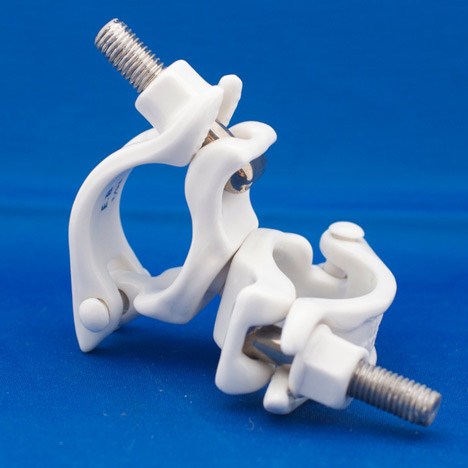Berlin designers Beta Tank want to make scaffolding pretty. Designer Eyal Burstein has started out by casting a series of scaffolding joints in glazed porcelain with gold and platinum nuts and bolts.
Burstein says the delicate pieces are the catalyst for a series of more practical scaffolding accessories, including bird houses and plant pots, so residents can add a little glamour to their building while it's temporarily covered in poles, planks and tarpaulins.
Beta Tank will present the project at the Victoria & Albert museum as part of the London Design Festival from 17 to 25 September.
The pieces shown here will be for sale in a limited edition of 25 in gold and 25 in platinum and a book called Scaffolding Brut will document the studio's research into scaffolding in cities around the world.
Their first book, Taxing Art, was accompanied by a series of furniture pieces designed to be taxed less because they're classed as art rather than design.
Other projects by Beta Tank include a USB stick that's attached to a brick and a lolly pop that makes you hallucinate.
Here are some more details from Burstein:
Beta Tank is showcasing new work from the Scaffolding Brut project at the Victoria and Albert museum during the London Design Festival in September 2011. To mark this occasion, Beta Tank has made a limited edition of Porcelain Scaffolding Joints, which can be purchased through this site. Each set is made from glazed porcelain and includes a scaffolding joint and pole with a nut and bolt. The nut and bolt come in either platinum or gold leaf.
‘Scaffolding Brut’, an installation by Beta Tank, presents the studio's perception of scaffolding – both its current impact and its potential future. Using scaffolding as an artistic medium, Beta Tank presents the possibility that it may beautify and enhance the urban landscape that it dominates. This installation presents a variety of porcelain scaffolding parts as an argument in favour of beautifying this essential building infrastructure.
Beta Tank has been fascinated by scaffolding for a few years. Although these structures are found on almost every street, their aesthetic form comes from a system of safety requirements and repetitive engineering configurations, rather than any artistic endeavour. The fact that such a visual construction universally exists untouched by design is an extremely interesting phenomenon that is inspirational.
Beta Tank is primarily interested in the following questions, "If scaffolding systems are so impressive without design specifications, how utterly magnificent could they become if the need for beauty was attributed to construction?" And, "given the fact that they cover large sections of any given city, rather than getting in the way, could scaffolding assist accessibility and mobility?"
Beta Tank is working on his second book Scaffolding Brut, which looks at scaffolding from all over the world and discusses its effect on cities, also providing possible futures for scaffolding, aesthetically and even on an engineering level. Scaffolding Brut will be a visual and animated investigation of the phenomenon of scaffolding, discussing the beauty of the fact that it is yet undesigned and exploring the possibilities of using the scaffolding system as an artistic medium which one could use to design, with the hope of improving the aesthetics of urban life taken for granted.
Beta Tank has a similar process for creating objects for every project he works on: a concept is created, then researched; the objects that follow are produced as a way for Beta Tank to better understand the original concept. The same process has been used in the project Scaffolding Brut that has led to the design of the pieces that will be shown at the Victoria and Albert Museum for the London Design Festival 2011.
On show are three different sets of scaffolding accessories for the residents of buildings covered by scaffolding. While regular pedestrians may sometimes clash with the ever-present scaffolding, the resident whose house's facade is taken over by scaffolding is most negatively affected by these structures. The idea of these accessories is to offer a solution to the tenants, by giving them beautiful objects that actually use the scaffolding system and can therefore be attached (and taken off) at will. The first accessory set is a collection of bird houses, the second is an assortment of identical vases creating an urban garden, and the third is a romantic date scenario, which includes candle holders, a vase, a wine cooler, and even a radio. The accessories will be bought and attached to the scaffolding by the tenants, but the effect the objects produce will also be for the benefit of the pedestrians. The birdhouses, but especially the vases will invite nature into the city.
Covering the facade of a scaffolded building with vases and plants will create a tall, vertical garden, improving the raggedy look of the often-torn tarpaulin. The romantic date accessory allows the tenants to take charge and even increase the area and use of their outside space. They can take advantage of the scaffolding that was once in their way. All of accessories are connected to one scaffolding pole and made completely out of porcelain. This royal material stands in stark contrast to the brutish and often dirty steel to which we are accustomed when thinking of scaffolding.
Obviously there is a difference between the extreme that is exhibited and the product that has potential industrial application. Porcelain, with its majestic beauty, is the starting point, but the accessories that tenants would buy will be made out of the usual steel used for scaffolding.
Scaffolding has existed for thousands of years, dating back to the construction of ancient pyramids. Interestingly, the only major change has been the switch from wood to steel, which only happened in the last 60 years, and not even throughout the world; bamboo scaffolding is still used in some Asian countries. Beta Tank is making a change: using the scaffolding that assists in building to assist in improving the attractiveness of a city.

